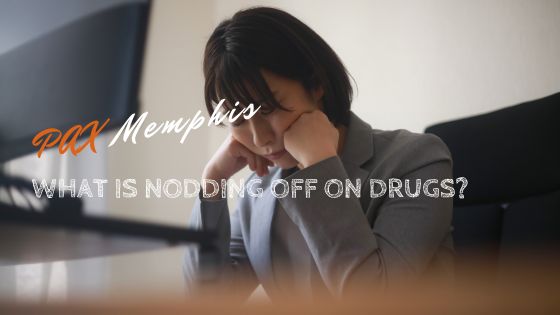If someone you love abuses drugs, you might notice significant changes in their physical health, emotional well-being, and behaviors. Different drugs cause different symptoms. One symptom of drug abuse is “nodding off.”
What is nodding off, and what drugs may cause it? This article will examine what it means to “nod off” and what it might mean about their substance use. If you or someone you love needs help to stop using drugs, reach out to the PAX Memphis team to learn about our high-quality substance abuse treatment programs.
What Does “Nodding Off” Mean?
“Nodding off” means slipping in and out of consciousness. This is a common symptom for people who use drugs that depress central nervous system activity. When people nod off, they may look like they’re falling asleep. People can nod off while standing up or while talking, and may either mumble or be silent. They may wake up if someone speaks to them, touches them, or there is a loud noise–but they will likely return to their semi-conscious state soon after.
Nodding off is different from simply falling asleep or struggling to stay awake while bored. It is a symptom of someone who has taken enough of a central nervous system depressant to partially lose consciousness.
Nodding off can indicate that someone is struggling with addiction to opioids, benzodiazepines, or other substances.
What Drugs May Cause Nodding Off?
Any drug with sedating effects can cause someone to nod off. Here are some of the substances associated with nodding off.
Benzodiazepines
Benzodiazepines are a class of prescription sedative medications used to treat a range of conditions, including:
- Sleep disorders
- Panic attacks
- Anxiety
- Alcohol withdrawal
Common benzodiazepines include:
- Xanax
- Ativan
- Valium
These drugs slow CNS activity and give users a calming, sedative sensation. People who use benzodiazepines, especially in large doses, may nod off from excessive sedation.
Opioids
Opioids are the drugs most commonly associated with nodding off. Morphine, oxycodone, heroin, and other opioid drugs slow CNS activity and many bodily functions. Users may nod off as the sedative effects of opioids take hold.
Barbiturates
Barbiturate use is not as common as it was in the past because of the risk of addiction that these drugs pose. However, people who use barbiturates like phenobarbitol may nod off from the medication’s sedating effects.
Alcohol
Alcohol is a depressant, meaning it slows brain activity and can cause sedation. Drinking excessively can cause people to slip in and out of consciousness.
The Dangers of Nodding Off
Any time someone loses consciousness unexpectedly, it can be dangerous. Nodding off puts people at immediate risk of harm and may lead to life-threatening consequences. Here are some of the most significant dangers of nodding off.
Breathing problems
Nodding off can lead to respiratory suppression, which may become life-threatening. Sedative drugs that slow CNS activity can impair a person’s breathing. Breathing may become too slow or shallow to provide enough oxygen, leading to coma or death without emergency medical intervention.
Overdose
Slipping in and out of consciousness can be disorienting, and people may unintentionally use too much of a drug. Nodding off increases the risk of fatal overdose, especially with opioid use.
Accidents
Nodding off can occur in dangerous situations, such as when someone is walking or driving. People who use depressant drugs may fall, be involved in a car accident, burn themselves, or become injured in other ways when nodding off. Many drugs associated with nodding off can impair a person’s judgment and make them more vulnerable to accidents, injuries, and being the victim of an assault or other crime.
Recognizing The Signs of an Opioid Overdose
Opioid abuse can quickly spiral into a life-threatening addiction. People who use opioids regularly may develop tolerance–meaning they need to use more of the drug to get the desired effects–and dependence.
One of the biggest dangers of opioid abuse is the risk of experiencing an overdose. An opioid overdose occurs when someone takes an amount of an opioid that exceeds their body’s ability to cope, putting them in danger of dying.
Nodding off can be a sign of an opioid overdose. However, someone who is nodding off but still breathing and able to respond may not be experiencing an overdose.
Some of the most common signs of an opioid overdose include:
- Pale or blueish skin
- Limp body
- Lips and fingernails are blue
- Weak heartbeat
- Low blood pressure
- Slow or shallow breathing
- Gurgling or gasping noises
- Vomiting
- Unresponsiveness
- Coma
- Death
Anyone who uses opioids is at risk of a deadly overdose. If someone near you exhibits symptoms of an opioid overdose, call 911 and wait with them until help arrives. Administer naloxone (Narcan) if it’s available.
Find Help Now
If you or someone you love struggles with opioid or other substance abuse, you are not alone. Comprehensive, compassionate treatment is just a phone call away.
Don’t wait for another day to go by without getting the life-saving care and support you need. Contact the PAX Memphis specialists today to learn about your high-quality addiction treatment options or to find support at any stage of your recovery journey.
Medically Reviewed: September 25, 2019

All of the information on this page has been reviewed and verified by a certified addiction professional.










